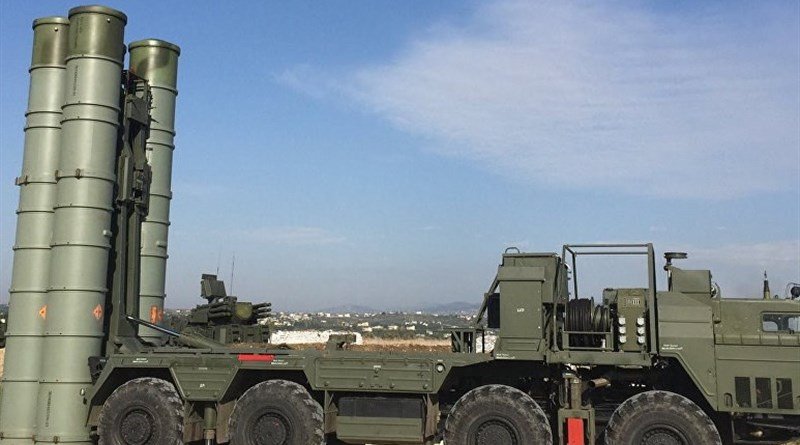Erdogan May Come To Regret His Russian Gambit – OpEd
By Arab News
By Osama Al-Sharif*
US President Donald Trump is likely to take the advice of top military aides and impose economic sanctions against Turkey, which announced at the weekend that it had received the first shipment of the controversial S-400 air defense system from Russia. Even though Trump appeared to sympathize with Turkey’s decision to buy the advanced Russian system when he met with Turkish President Recep Tayyip Erdogan in Japan last month, the cost of doing nothing would be disastrous.
After his meeting with Erdogan, Trump said he understood Ankara’s decision to buy the S-400 since the Obama administration had failed to supply Turkey with the Patriot missile system. But Erdogan’s gambit is likely to backfire. The deal signals a major shift by one of NATO’s major members, not only in military terms but geopolitically as well.
The $2.5 billion deal may turn out to be Erdogan’s most expensive and risky investment. Initially it would deny Turkey the chance to acquire the world’s most advanced combat aircraft: The F-35 stealth fighter jet. Already Turkish pilots training on that model have been ordered to leave the US. The S-400 air defense system is designed to shoot down NATO planes, including the F-35.
The delivery of the Russian missiles, which will be completed by next year, raises major problems for NATO and the US. Russian engineers will accompany the system to train the Turkish military. That means they will have access to sensitive NATO military systems in Turkey, including classified information related to the F-35, which Ankara helps build.
The integration of the S-400 into Turkey’s air defense system will also pose a problem. NATO fears that the Russian system will fail to identify its aircraft as friendly and will hinder future joint exercises between Turkey and its Western allies. However, defenders of the deal also see an opportunity for NATO to have a close look at one of Russia’s most advanced air defense systems.
But the implications of the deal go beyond military consequences and challenges. It signals a further shift in Turkish-US ties; something that Erdogan has been overseeing for years. What Ankara stands to gain, or most likely lose, from this deliberate departure from a decades-old alliance is puzzling.
The consummation of the S-400 deal brings Erdogan and Russian President Vladimir Putin closer than ever before. It also marks further Russian involvement in the region; which started with Moscow’s military intervention in Syria in 2015. It coincides with a confused and confusing US strategic vision for the region. The Obama administration had started what appeared to be a slow parting from the Middle East and pivot toward Asia. Trump wants to limit the US military presence in the region even as he escalates with Iran. As recently as three weeks ago, he tweeted that the US shouldn’t be patrolling the shipping lanes in the Strait of Hormuz and that major oil importers like China and Japan should be protecting their own ships in the Arabian Gulf.
Putin has been coordinating with Erdogan and Iran’s Hassan Rouhani over Syria, while cultivating closer ties with regional leaders including Saudi Arabia, which he will visit in October, Egypt and Jordan, among others.
But the S-400 deal with Turkey, until recently a close ally of the West, should be viewed as a milestone in Russia’s deeper involvement in the region. It signals the rise of a strategic alliance between Moscow and Ankara; one that could cost Turkey its membership in NATO.
Erdogan has tried to pre-empt Washington’s threat of sanctions by reminding Trump that bilateral trade between the two countries is worth more than $100 billion annually, and that both sides will suffer if Ankara is penalized. But how can Erdogan expect to maintain normal ties with Washington when he is now seen as a close ally of America’s archenemy?
US-Turkish ties have been strained over the past few years over the failure of the US to hand over Turkish preacher Fethullah Gulen, who Ankara claims is the architect of the failed coup attempt in 2016. Erdogan is also miffed by Washington’s policies in Syria, especially its decision to arm the Kurdish People’s Protection Units, which he sees as an offshoot of the outlawed Kurdistan Workers’ Party.
But, if Erdogan believes he can decrease his dependence on the West by cozying up to Putin, he is making a major miscalculation. The alliance with the US goes deep into Turkey’s industrial, financial and economic infrastructures, in addition to the military. Russia can hardly make up for major Turkish losses in all of these sectors, especially since the economy is already in trouble and the lira is suffering.
Furthermore, experts believe the S-400 is not a standalone system and that it will require additional Russian-made components, which will make their integration into the Turkish military even harder and more costly. It’s a gambit that Erdogan may live to regret.
- Osama Al-Sharif is a journalist and political commentator based in Amman. Twitter: @plato010


LOL.I’m sure that the neocons will do their worst to see to it.